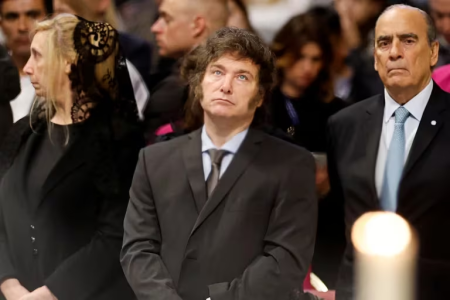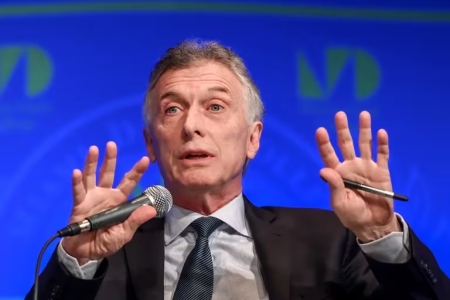Milei faces the critical section of the adjustment with disenchanted allied sectors and Peronism thrown into a hostile opposition - Infobae

Source:

 www.infobae.com
www.infobae.com
February 1, 2024
Dialogue governors and the UCR distanced themselves from the Government and are waiting for a call from the President. The PJ, with Kirchnerism and the CGT at the head, redouble the pressure. Meanwhile, poverty rose to 57% in January and a new jump is expected in February
By Facundo Chaves

Javier Milei faces the most difficult stretch of adjustment with disenchanted allies and Peronism on a war footing
The 57% poverty rate that the UCA reported over the weekend was just a warning, an alert of what is to come. Javier Milei is the first to be aware of the impact of the measures he took as soon as he came to government to stabilize an economy that was heading towards collapse. He studied it in books and experienced it firsthand in Argentina. He knew the social cost of the devaluation jump, the release of repressed prices and tariffs and the disclosure of variables that for more than 15 years were artificially contained. Therefore, the president knows that it will depend on the time in which the good news arrives. He spoke that March and April will be the most difficult months and that in May we could see the light at the end of the tunnel.
This approach applied in the management of economic emergencies contrasts with what happens in politics. Last Friday, in the meeting they had by videoconference - which Infobae anticipated - the governors of the UCR and the PRO made catharsis of accumulated quarrels with the president, they agreed to maintain unity and not make any more decisions until being summoned by Milei. 9 of the 10 were there - only Gustavo Valdés from Corrientes was missing - and in all of them, with more or less vehemence, there was a feeling of disenchantment, frustration and helplessness .
This is a block of 10 governors who were the first committed to supporting the government plan and, above all, to blocking the obstructionist outbursts that Peronism manifests when it stops being the ruling party and becomes the opposition. They are responsible for having prevented the Union for the Homeland bloc in the Senate from annulling the DNU that deregulated the economy, because the K had 33 seats over the 37 needed for the majority. And the deputies have contributed to approve in committee, first, and in general in the chamber, the voluminous project of the “Omnibus Law.”
“Not only did they not thank us. They have been treating us the same as Kirchnerism, because they stepped on the transfers to all the provinces. Milei insulted us because the first 6 articles of the Omnibus Law were not approved as he wanted and on top of that he removed subsidies for transportation and teachers. With so much punishment, we are left with no reason to be an official, neither allies nor dialogueists. Until the President calls us, we agree that we are not going to do anything more for them,” said one of the nine governors who connected to Zoom on Friday.
Beyond the fact that some translated that decision as an “ultimatum”, between governors with a strong position in that bloc that was called Together for Change and that is now in full metamorphosis - due to the confluence of Milei with Mauricio Macri's PRO - the look was different. “We don't want it to be thought that there is any imposition. We hope you will receive us, but we are not going to ask you for a meeting. And the truth is that I don't think he will call us either,” responded another provincial leader.

The last meeting that deputies and governors had with Minister Francos
Those 10 governors are not the only ones. There is also annoyance in the Cordoban Peronist Martín Llaryora , in the provincials such as Gustavo Sáenz (Salta), Hugo Passalacqua (Misiones), Rolo Figueroa (Neuquén), Alberto Weretilneck (Río Negro) and Claudio Vidal (Santa Cruz). Even Osvaldo Jaldo (Tucumán) is chewing anger, because he broke the Union for the Homeland bloc to protect the sugar and lemon sector from the “Omnibus Law”, which did not even pass the filter of Deputies. Another retaliation fell on this group: the dismissal of Osvaldo Giordano from Cordoba, from Anses; and Flavia Royón, from Salta, from the Ministry of Mining. In any case, they plan to meet tomorrow at an event organized by Sáenz in his province with Minister Francos.
The withdrawal of the allied governors coincides with the turn of radicalism to a more critical position with the direction of the Executive. The president of the UCR, Senator Martín Lousteau, already says openly that Milei's DNU that deregulates the economy is “unconstitutional” and that some main ideas of the libertarian creed are impracticable or, simply, bad.
“I am against the DNU and it seems unconstitutional to me,” he stated in public statements and then demanded from the president of the Chamber of Deputies, the libertarian deputy Martín Menem, that “according to the Bicameral, the most serious thing is that it cannot be treated like corresponds. There cannot be a delay in establishing it.” How much life would the decree have left if the radicals vote alongside Kirchnerism? Some have the answer.
Beyond the fact that Macri and Milei plan to speak to establish a new alliance between La Libertad Avanza, the PRO and a fraction of the sector chaired by Miguel Pichetto, the confluence of both blocks does not predict, in principle, a bench of more than 80 deputies . To have a quorum and, therefore, approve the laws, 129 are required. In the Senate the panorama is more bleak, because the PRO has 8 and the libertarians 7: just 15 out of 72.
In the PRO and in LLA the view is different. They trust that Macri could be a key actor to align the PRO governors and convene a sector of radicalism, if you will, that is more anti-Peronist/anti-Kirchnerist, who has a reference in Luis Petri from Mendoza, the Minister of Defense. The precedent mentioned is that of the Omnibus Law, since the former president who intervened so that the bloc remained united and voted unanimously in favor of the project.

Archive photograph of former Argentine president Mauricio Macri. EFE/Giorgio Viera
This context of political weakness, beyond the fact that in the polls the popular support numbers for Milei do well, Peronism is in times of realignment, under a logic of greater confrontation, of the three sectors that in institutional terms and in the The CGT, the social movements and Kirchnerism have the greatest weight. Cristina Kirchner's letter last week set the tone, the background music. Especially because among many numbers and more words she raised the ghost of unfinished governments.
“The political space that had raised the hopes of the majority of Argentine society after the civil-military dictatorship and had obtained 52% of the votes, ended up handing over power in advance,” Cristina said about Alfonsín. And he added, so that there were no doubts, the Delarruista experience: “The president who had won in the first round with more than 48% of the votes, ended up presenting his resignation after declaring the State of Siege that caused repression and 38 deaths in the Plaza de Mayo and in different places in the country.”
Meanwhile, the CGT redoubled the pressure against Milei's government and anticipated a "guerrilla war", with strikes by sectors, protests and mobilizations. It is a sequence that may or may not culminate in a call for a general strike. They have reasons besides the delay in salaries: the president gave the order to go for social works, a true casus belli for the bosses of Argentine unionism.

Source:

Milei enfrenta el tramo crítico del ajuste con sectores aliados desencantados y el peronismo lanzado a una oposición hostil
Gobernadores dialoguistas y la UCR tomaron distancia del Gobierno y esperan una convocatoria del Presidente. El PJ, con el kirchnerismo y la CGT a la cabeza, redoblan la presión. Mientras, la pobreza escaló al 57% en enero y se espera un nuevo salto en febrero
February 1, 2024
Dialogue governors and the UCR distanced themselves from the Government and are waiting for a call from the President. The PJ, with Kirchnerism and the CGT at the head, redouble the pressure. Meanwhile, poverty rose to 57% in January and a new jump is expected in February
By Facundo Chaves

Javier Milei faces the most difficult stretch of adjustment with disenchanted allies and Peronism on a war footing
The 57% poverty rate that the UCA reported over the weekend was just a warning, an alert of what is to come. Javier Milei is the first to be aware of the impact of the measures he took as soon as he came to government to stabilize an economy that was heading towards collapse. He studied it in books and experienced it firsthand in Argentina. He knew the social cost of the devaluation jump, the release of repressed prices and tariffs and the disclosure of variables that for more than 15 years were artificially contained. Therefore, the president knows that it will depend on the time in which the good news arrives. He spoke that March and April will be the most difficult months and that in May we could see the light at the end of the tunnel.
This approach applied in the management of economic emergencies contrasts with what happens in politics. Last Friday, in the meeting they had by videoconference - which Infobae anticipated - the governors of the UCR and the PRO made catharsis of accumulated quarrels with the president, they agreed to maintain unity and not make any more decisions until being summoned by Milei. 9 of the 10 were there - only Gustavo Valdés from Corrientes was missing - and in all of them, with more or less vehemence, there was a feeling of disenchantment, frustration and helplessness .
This is a block of 10 governors who were the first committed to supporting the government plan and, above all, to blocking the obstructionist outbursts that Peronism manifests when it stops being the ruling party and becomes the opposition. They are responsible for having prevented the Union for the Homeland bloc in the Senate from annulling the DNU that deregulated the economy, because the K had 33 seats over the 37 needed for the majority. And the deputies have contributed to approve in committee, first, and in general in the chamber, the voluminous project of the “Omnibus Law.”
“Not only did they not thank us. They have been treating us the same as Kirchnerism, because they stepped on the transfers to all the provinces. Milei insulted us because the first 6 articles of the Omnibus Law were not approved as he wanted and on top of that he removed subsidies for transportation and teachers. With so much punishment, we are left with no reason to be an official, neither allies nor dialogueists. Until the President calls us, we agree that we are not going to do anything more for them,” said one of the nine governors who connected to Zoom on Friday.
Beyond the fact that some translated that decision as an “ultimatum”, between governors with a strong position in that bloc that was called Together for Change and that is now in full metamorphosis - due to the confluence of Milei with Mauricio Macri's PRO - the look was different. “We don't want it to be thought that there is any imposition. We hope you will receive us, but we are not going to ask you for a meeting. And the truth is that I don't think he will call us either,” responded another provincial leader.

The last meeting that deputies and governors had with Minister Francos
Those 10 governors are not the only ones. There is also annoyance in the Cordoban Peronist Martín Llaryora , in the provincials such as Gustavo Sáenz (Salta), Hugo Passalacqua (Misiones), Rolo Figueroa (Neuquén), Alberto Weretilneck (Río Negro) and Claudio Vidal (Santa Cruz). Even Osvaldo Jaldo (Tucumán) is chewing anger, because he broke the Union for the Homeland bloc to protect the sugar and lemon sector from the “Omnibus Law”, which did not even pass the filter of Deputies. Another retaliation fell on this group: the dismissal of Osvaldo Giordano from Cordoba, from Anses; and Flavia Royón, from Salta, from the Ministry of Mining. In any case, they plan to meet tomorrow at an event organized by Sáenz in his province with Minister Francos.
The withdrawal of the allied governors coincides with the turn of radicalism to a more critical position with the direction of the Executive. The president of the UCR, Senator Martín Lousteau, already says openly that Milei's DNU that deregulates the economy is “unconstitutional” and that some main ideas of the libertarian creed are impracticable or, simply, bad.
“I am against the DNU and it seems unconstitutional to me,” he stated in public statements and then demanded from the president of the Chamber of Deputies, the libertarian deputy Martín Menem, that “according to the Bicameral, the most serious thing is that it cannot be treated like corresponds. There cannot be a delay in establishing it.” How much life would the decree have left if the radicals vote alongside Kirchnerism? Some have the answer.
Beyond the fact that Macri and Milei plan to speak to establish a new alliance between La Libertad Avanza, the PRO and a fraction of the sector chaired by Miguel Pichetto, the confluence of both blocks does not predict, in principle, a bench of more than 80 deputies . To have a quorum and, therefore, approve the laws, 129 are required. In the Senate the panorama is more bleak, because the PRO has 8 and the libertarians 7: just 15 out of 72.
In the PRO and in LLA the view is different. They trust that Macri could be a key actor to align the PRO governors and convene a sector of radicalism, if you will, that is more anti-Peronist/anti-Kirchnerist, who has a reference in Luis Petri from Mendoza, the Minister of Defense. The precedent mentioned is that of the Omnibus Law, since the former president who intervened so that the bloc remained united and voted unanimously in favor of the project.

Archive photograph of former Argentine president Mauricio Macri. EFE/Giorgio Viera
This context of political weakness, beyond the fact that in the polls the popular support numbers for Milei do well, Peronism is in times of realignment, under a logic of greater confrontation, of the three sectors that in institutional terms and in the The CGT, the social movements and Kirchnerism have the greatest weight. Cristina Kirchner's letter last week set the tone, the background music. Especially because among many numbers and more words she raised the ghost of unfinished governments.
“The political space that had raised the hopes of the majority of Argentine society after the civil-military dictatorship and had obtained 52% of the votes, ended up handing over power in advance,” Cristina said about Alfonsín. And he added, so that there were no doubts, the Delarruista experience: “The president who had won in the first round with more than 48% of the votes, ended up presenting his resignation after declaring the State of Siege that caused repression and 38 deaths in the Plaza de Mayo and in different places in the country.”
Meanwhile, the CGT redoubled the pressure against Milei's government and anticipated a "guerrilla war", with strikes by sectors, protests and mobilizations. It is a sequence that may or may not culminate in a call for a general strike. They have reasons besides the delay in salaries: the president gave the order to go for social works, a true casus belli for the bosses of Argentine unionism.

